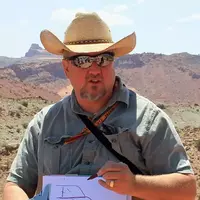Geology, Society, and Justice: An undergraduate and graduate level place-based geoscience class to recenter land justice in geoscience education
Poster Session Part of
Monday Poster Session
Authors
 Cameron Reed, University of New Mexico-Main Campus
Cameron Reed, University of New Mexico-Main Campus
 Lindsay Worthington, University of New Mexico-Main Campus
Lindsay Worthington, University of New Mexico-Main Campus
 Steven Semken, Arizona State University at the Tempe Campus
Steven Semken, Arizona State University at the Tempe Campus
 Jennifer Richter, Arizona State University at the Tempe Campus
Jennifer Richter, Arizona State University at the Tempe Campus
Geoscience education has long been guided by formulaic objective truth-seeking and methodologies inherited from centuries of practice rooted in the Western worldview that continues to permeate and shape the role of geoscience. Overdue efforts to promote diversity, equity, and inclusion in higher education are welcome and necessary. However, they fall short of addressing entrenched social and environmental injustices if they fail to challenge traditional disciplinary pedagogies and training in one of the least diverse STEM fields. Geoscience permeates every aspect of place-making and is central in concerns in large geopolitical questions. As Indigenous and Western geographies both hold, the peoples and their human networks are as much a part of the landscape as the rocks, biota, and water that form and define it. Rooting learning in sense of place or querencia improves engagement with geosciences within the storied landscapes we study and teach about. Fundamentally, people are inseparable from landscapes and memories of place are recorded across human, other than human, and geologic dimensions.
In this interdisciplinary course, we employ place-based education that draws from a broad swath of disciplines and worldviews. We seek to create a space where students from different disciplines and backgrounds co-create new knowledge and perspectives to face complex issues of injustices head-on. Open to undergraduate and graduate students in and beyond geosciences, "Geology, Society, and Justice" bridges the gap between faculty-led BAJEDI programs and student experiences in classroom settings by challenging the traditional roles of geoscientists and land. We recenter relations between land and people within discussions of geoscientific issues and highlight the un-generalizable perspectives, research, and experiences of historically excluded voices. To enact change, we must challenge the geoscientific paradigm and work to decolonize the classroom and minds of future geoscientists as an act of ongoing praxis of land justice.
In this interdisciplinary course, we employ place-based education that draws from a broad swath of disciplines and worldviews. We seek to create a space where students from different disciplines and backgrounds co-create new knowledge and perspectives to face complex issues of injustices head-on. Open to undergraduate and graduate students in and beyond geosciences, "Geology, Society, and Justice" bridges the gap between faculty-led BAJEDI programs and student experiences in classroom settings by challenging the traditional roles of geoscientists and land. We recenter relations between land and people within discussions of geoscientific issues and highlight the un-generalizable perspectives, research, and experiences of historically excluded voices. To enact change, we must challenge the geoscientific paradigm and work to decolonize the classroom and minds of future geoscientists as an act of ongoing praxis of land justice.


